| Listing 1 - 10 of 10 |
Sort by
|
Book
ISBN: 8822230345 Year: 1981 Volume: 7 163 Publisher: Firenze : Olschki Editore,
Abstract | Keywords | Export | Availability | Bookmark
 Loading...
Loading...Choose an application
- Reference Manager
- EndNote
- RefWorks (Direct export to RefWorks)
Noble savage stereotype in literature. --- French literature --- Bon sauvage dans la littérature --- Littérature française --- History and criticism --- Congresses. --- Histoire et critique --- Congrès
Book
ISBN: 3899132165 Year: 2002 Volume: 10 Publisher: Würzburg : Ergon,
Abstract | Keywords | Export | Availability | Bookmark
 Loading...
Loading...Choose an application
- Reference Manager
- EndNote
- RefWorks (Direct export to RefWorks)
Noble savage stereotype --- Ethnology --- Noble savage stereotype in literature --- Bon sauvage --- Anthropologie sociale et culturelle --- Bon sauvage dans la littérature --- Congresses. --- Philosophy --- Congrès --- Philosophie
Book
ISBN: 9789722715652 9722715658 Year: 2008 Publisher: Lisboa : Imprensa Nacional-Casa da Moeda,
Abstract | Keywords | Export | Availability | Bookmark
 Loading...
Loading...Choose an application
- Reference Manager
- EndNote
- RefWorks (Direct export to RefWorks)
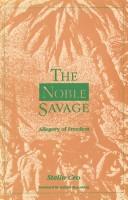
ISBN: 0889209839 1554584582 0889208476 9780889208476 Year: 2006 Publisher: Waterloo Wilfrid Laurier University Press
Abstract | Keywords | Export | Availability | Bookmark
 Loading...
Loading...Choose an application
- Reference Manager
- EndNote
- RefWorks (Direct export to RefWorks)
Stelio Cro's revealing work, arising from his more than half dozen previous books, considers the eighteenth-century Enlightenment in the context of the European experience with, and reaction to, the cultures of America's original inhabitants. Taking into account Spanish, Italian, French, and English sources, the author describes how the building materials for Rousseau's allegory of the Noble Savage came from the early Spanish chroniclers of the discovery and conquest of America, the Jesuit Relations of the Paraguay Missions (a Utopia in its own right), the Essais of Montaigne, Itali
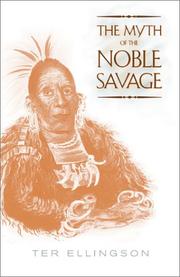
ISBN: 0520925920 128275887X 1597347671 9786612758874 9780520925922 0585389799 9780585389790 9781597347679 9781282758872 6612758872 0520222687 9780520222687 0520226100 9780520226104 Year: 2001 Publisher: Berkeley University of California Press
Abstract | Keywords | Export | Availability | Bookmark
 Loading...
Loading...Choose an application
- Reference Manager
- EndNote
- RefWorks (Direct export to RefWorks)
In this important and original study, the myth of the Noble Savage is an altogether different myth from the one defended or debunked by others over the years. That the concept of the Noble Savage was first invented by Rousseau in the mid-eighteenth century in order to glorify the "natural" life is easily refuted. The myth that persists is that there was ever, at any time, widespread belief in the nobility of savages. The fact is, as Ter Ellingson shows, the humanist eighteenth century actually avoided the term because of its association with the feudalist-colonialist mentality that had spawned it 150 years earlier. The Noble Savage reappeared in the mid-nineteenth century, however, when the "myth" was deliberately used to fuel anthropology's oldest and most successful hoax. Ellingson's narrative follows the career of anthropologist John Crawfurd, whose political ambition and racist agenda were well served by his construction of what was manifestly a myth of savage nobility. Generations of anthropologists have accepted the existence of the myth as fact, and Ellingson makes clear the extent to which the misdirection implicit in this circumstance can enter into struggles over human rights and racial equality. His examination of the myth's influence in the late twentieth century, ranging from the World Wide Web to anthropological debates and political confrontations, rounds out this fascinating study.
Racisme en anthropologie --- Bon sauvage dans la litterature. --- Bon sauvage. --- Anthropologie --- Racism in anthropology --- Noble savage in literature. --- Noble savage. --- Anthropology --- Savage, Noble --- Ethnology --- Primitivism in literature --- Histoire. --- Philosophie. --- History. --- Philosophy. --- Philosophy --- Noble savage in literature --- Noble savage --- Savage, Noble (Stereotype) --- Stereotypes (Social psychology) --- Noble savage stereotype. --- Noble savage stereotype in literature --- 18th century. --- 19th century. --- academic. --- anthropologists. --- anthropology. --- case study. --- colonialist. --- contemporary. --- debunked. --- feudalist. --- folklore. --- internet. --- legal issues. --- modern world. --- mythology. --- natural life. --- natural world. --- nature. --- noble savage. --- online. --- political. --- politics. --- race issues. --- racial equality. --- racism. --- racist. --- research. --- rousseau. --- savages. --- scholarly. --- stereotype. --- study. --- Noble savage stereotype in literature.
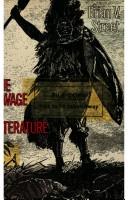
ISBN: 0710081103 9780710081100 Year: 1975 Publisher: London: Routledge,
Abstract | Keywords | Export | Availability | Bookmark
 Loading...
Loading...Choose an application
- Reference Manager
- EndNote
- RefWorks (Direct export to RefWorks)
English fiction --- Primitive societies in literature --- History and criticism --- 82.04 --- -English fiction --- -Primitive societies in literature --- Man, Primitive, in literature --- Society, Primitive, in literature --- English literature --- Literaire thema's --- Primitive societies in literature. --- History and criticism. --- 82.04 Literaire thema's --- Noble savage stereotype in literature --- English fiction - 19th century - History and criticism --- English fiction - 20th century - History and criticism
Book
ISBN: 1280497033 9786613592262 9401206864 9789401206860 9042033991 9789042033993 9789042033993 Year: 2011 Publisher: New York Rodopi
Abstract | Keywords | Export | Availability | Bookmark
 Loading...
Loading...Choose an application
- Reference Manager
- EndNote
- RefWorks (Direct export to RefWorks)
Savage Songs andamp; Wild Romances considers the various types of poetry – from short songs and laments to lengthy ethnographic epics – which nineteenth-century settlers wrote about indigenous peoples as they moved into new territories in North America, South Africa, and Australasia. Drawing on a variety of texts (some virtually unknown), the author demonstrates the range and depth of this verse, suggesting that it exhibited far more interest in, and sympathy for, indigenous peoples than has generally been acknowledged. In so doing, he challenges both the traditional view of this poetry as derivative and eccentric, and more recent postcolonial condemnations of it as racist and imperialist. Instead, he offers a new, more positive reading of this verse, whose openness towards the presence of the indigenous Other he sees as an early expression of the tolerance and cultural relativity characteristic of modern Western society. Writers treated include George Copway, Alfred Domett, Henry Wadsworth Longfellow, George McCrae, Thomas Pringle, George Rusden, Lydia Sigourney, and Alfred Street.
Poetry, Modern --- Indigenous peoples in literature. --- Colonies in literature. --- Poetry --- Poetry, Modern. --- Modern poetry --- Adivasis in literature --- History and criticism. --- Social aspects. --- 1800-1899 --- Indians in literature. --- Noble savage in literature. --- Indians of Central America in literature --- Indians of Mexico in literature --- Indians of North America in literature --- Indians of South America in literature --- Indians of the West Indies in literature --- Noble savage in literature --- Noble savage stereotype in literature.
Multi
ISBN: 9783770554690 3770554698 3846754692 9783846754696 Year: 2013 Publisher: Paderborn : Wilhelm Fink Verlag,
Abstract | Keywords | Export | Availability | Bookmark
 Loading...
Loading...Choose an application
- Reference Manager
- EndNote
- RefWorks (Direct export to RefWorks)
Nicola Gess liefert eine beeindruckende Explikation des »primitiven Denkens« im Spannungsfeld zwischen Wissenschaft, Kunsttheorie und Literatur und entlang der Figuren des »Wilden«, des Kindes und des »Wahnsinnigen«. Sie rekonstruiert erstens die Geschichte des Diskurses vom primitiven Denken in Ethnologie, Entwicklungspsychologie und Psychopathologie um und nach 1900, sie arbeitet zweitens die Bedeutung dieses Diskurses für Theorien der Kunst und der künstlerischen Sprache heraus und untersucht drittens an Robert Müller, Robert Musil, Gottfried Benn und Walter Benjamin das Phänomen eines literarischen Primitivismus, der das primitive Denken wiederzugewinnen, kritisch zu reflektieren oder im Sinne einer »anderen Rationalität« produktiv weiterzuentwickeln trachtet.
Société primitive --- Sauvages --- Primitivism in literature. --- Dans la littérature. --- Müller, Robert, --- Musil, Robert, --- Benn, Gottfried, --- Benjamin, Walter --- Benn, Gottfried --- Benjamin, Walter, --- Critique et interprétation --- Critique et interprétation. --- Criticism and interpretation. --- Musil, Robert --- German literature --- Literature, Modern --- Primitive societies in literature. --- Feral children in literature. --- Wild men in literature. --- Art and literature. --- Literature and art --- Literature and painting --- Literature and sculpture --- Painting and literature --- Sculpture and literature --- Aesthetics --- Literature --- Man, Primitive, in literature --- Primitive societies in literature --- Society, Primitive, in literature --- Noble savage stereotype in literature --- History and criticism. --- Société primitive --- Dans la littérature. --- Müller, Robert, --- Critique et interprétation --- Critique et interprétation. --- Primitive man stereotype in literature.
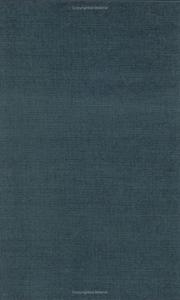
ISBN: 0198183003 0191673935 0585072019 Year: 1995 Publisher: Oxford [etc.] : Oxford University Press,
Abstract | Keywords | Export | Availability | Bookmark
 Loading...
Loading...Choose an application
- Reference Manager
- EndNote
- RefWorks (Direct export to RefWorks)
Anthropology in literature. --- Culture in literature. --- Ethnology in literature. --- Primitive societies in literature. --- Travel in literature. --- Conrad, Joseph, --- Knowledge --- Anthropology. --- 820 "19" CONRAD, JOSEPH --- Anthropology in literature --- Culture in literature --- Ethnology in literature --- Travel in literature --- Primitive societies in literature --- Voyages and travels in literature --- Man, Primitive, in literature --- Society, Primitive, in literature --- Engelse literatuur--20e eeuw. Periode 1900-1999--CONRAD, JOSEPH --- Conrad, Joseph --- -Knowledge --- -Anthropology --- 820 "19" CONRAD, JOSEPH Engelse literatuur--20e eeuw. Periode 1900-1999--CONRAD, JOSEPH --- -Korzeniowski, Joźef --- Conrad-Korzeniowski, Joseph --- Korzeniowski, Józef Konrad Teodor, --- Korzeniowski, Joseph Conrad Theodore, --- Konrad, Dzhozef, --- Kʻang-la-te, --- Conrad-Korzeniowski, Joseph, --- Korzeniowski, Joseph Conrad-, --- Kʻonradŭ, Josep, --- Kʻonradŭ, Chosep, --- Kʻolladŭ, Josep, --- Konrad, Dzd. --- Conrad, Józef, --- קונראד, ג׳וזף, --- קונראד, ג׳וסף --- קונרד, ג׳וזף --- קונרד, ג׳וזף, --- קונרד, יוסף --- 康拉德, --- Konrad Nalecz Korzeniowsky, Jozef Tedor, --- Konrant, Tzozeph, --- Noble savage stereotype in literature --- Anthropologie dans la litterature --- Conrad (jozef teodor konrad nalecz korzeniowski, dit joseph), 1857-1924
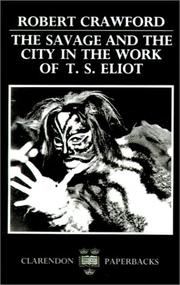
ISBN: 0198122519 Year: 1990 Publisher: Oxford Clarendon
Abstract | Keywords | Export | Availability | Bookmark
 Loading...
Loading...Choose an application
- Reference Manager
- EndNote
- RefWorks (Direct export to RefWorks)
820 "19" ELIOT, THOMAS STEARNS --- City and town life in literature --- Literature and anthropology --- Primitivism in literature --- Primitive societies in literature --- Man, Primitive, in literature --- Society, Primitive, in literature --- Anthropology and literature --- Anthropology --- Engelse literatuur--20e eeuw. Periode 1900-1999--ELIOT, THOMAS STEARNS --- Eliot, T. S. --- -Criticism and interpretation --- City and town life in literature. --- Literature and anthropology. --- Primitive societies in literature. --- Primitivism in literature. --- 820 "19" ELIOT, THOMAS STEARNS Engelse literatuur--20e eeuw. Periode 1900-1999--ELIOT, THOMAS STEARNS --- Ai-lüeh-tʻe, --- Eliot, Thomas Stearns, --- Īliyūt, T. S., --- Elliŏtʻŭ, --- Eliot, Thōmas S., --- Eliot, Th. S., --- Eliot, Thomas Stern, --- Elyoṭ, T. S., --- Ėliot, Tomas Stirns, --- אליוט ט.ס --- אליוט, ת. ס. --- Criticism and interpretation. --- Eliot, Thomas Stearns --- Noble savage stereotype in literature
| Listing 1 - 10 of 10 |
Sort by
|

 Search
Search Feedback
Feedback About UniCat
About UniCat  Help
Help News
News